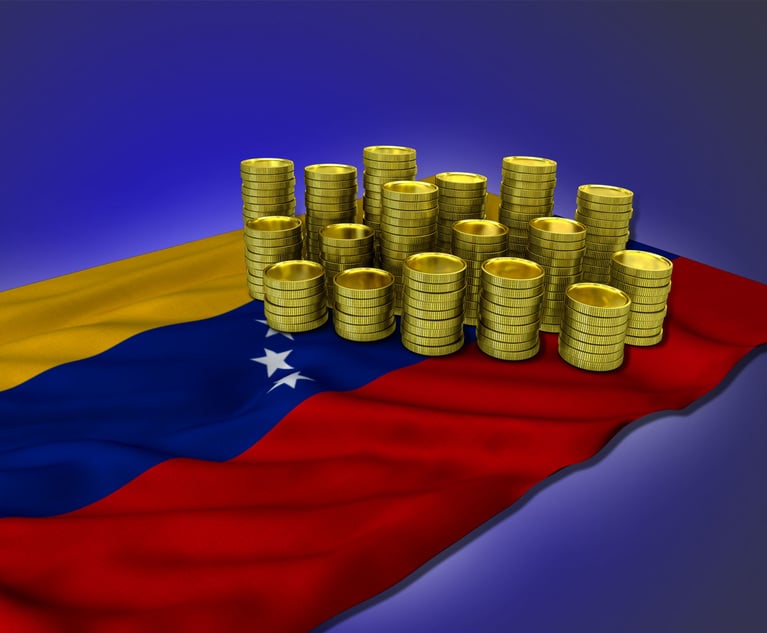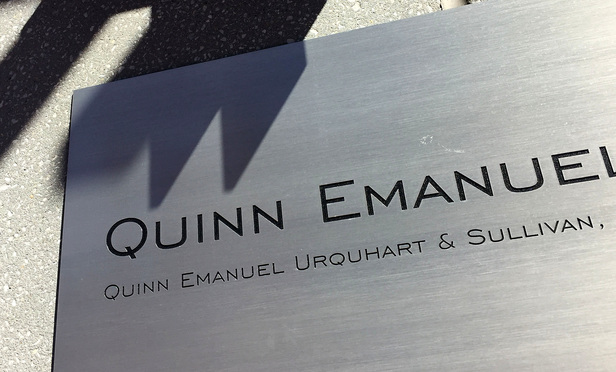Spat erupts between Quinn Emanuel and plaintiffs firms over foreign exchange manipulation litigation
Dispute comes as firms eye key roles on European litigation
May 18, 2017 at 08:21 AM
4 minute read
A pair of recent filings in US litigation over alleged foreign exchange rate manipulation has revealed a dispute that pits Quinn Emanuel Urquhart & Sullivan against plaintiffs firms Hausfeld and Scott + Scott.
The dispute, which revolves around foreign exchange rate antitrust litigation, takes on added import because all three firms are eyeing key roles in similar litigation in Europe.
The spat between the firms stems from a memorandum that Quinn Emanuel crafted in late 2016 and early 2017 about the foreign exchange rate antitrust litigation, and later sent to plaintiffs firm Bernstein Liebhard and multiple institutional investors.
Hausfeld and Scott + Scott serve as co-lead counsel in the US for investor plaintiffs in the foreign exchange rate litigation, while Quinn Emanuel in 2014 lost a bid for a lead plaintiffs counsel role.
The underlying antitrust suit alleges a widespread scheme involving many of the world's largest banks. They are accused of manipulating the foreign exchange market, which averages some $5trn in trading per day. A number of the bank defendants, including JPMorgan and Barclays, have settled the US litigation for a total of more than $2bn, although claims remain pending against several others, such as Credit Suisse and Deutsche Bank.
On 12 May, Hausfeld and Scott + Scott wrote in a brief that the memo Quinn Emanuel initially crafted and sent out contained misleading information about the settlement and deadlines to opt out of the class to pursue individual claims. In light of those communications, Scott + Scott and Hausfeld wrote, US District Judge Lorna Schofield in Manhattan should force Quinn Emanuel and Bernstein to turn over the names of the institutional investors they contacted.
"Plaintiffs have serious concerns that the communications could confuse class members or convince them to compromise their rights under the settlements based on erroneous information," the brief said.
But Quinn Emanuel, which responded on Monday, said the bid by Scott + Scott and Hausfeld was a ruse and that the information they asked for would be confidential under lawyer-client privilege. Quinn Emanuel accused Scott + Scott and Hausfeld of trying to obtain the information to give the firms a leg up in competing for a key role in parallel foreign exchange litigation expected to start soon in Europe.
"The decision whether or not to opt out is a particularly significant one for a number of large and sophisticated class members who suffered significant damages arising out of the FX cartel in the US… and overseas," Quinn Emanuel wrote in its brief. "Class counsel… have an obvious self-interest in preventing such entities from opting out and also in persuading these entities to engage them, rather than Quinn Emanuel or another law firm, in Europe."
Scott + Scott's Christopher Burke declined on Wednesday to comment while the issue is pending in court, and Michael Hausfeld of Hausfeld did not immediately respond to an email.
Both firms have previously cited the forex case as a driving force behind their efforts to expand and pursue antitrust cases across the Atlantic. Recent plaintiff-friendly reforms in the UK and the European Union have made those markets more attractive to US-based plaintiffs firms.
Daniel Brockett of Quinn Emanuel on Wednesday confirmed that his firm is actively competing against Scott + Scott and Hausfeld for potential European claims related to alleged forex market manipulation.
"We have really strong competition lawyers in our London office and I think we have said in our papers here that that's something that we're doing," he said. "We're actively advising potential clients in Europe."
Schofield has scheduled a hearing for 5 June on Scott + Scott and Hausfeld's motion to compel. The two firms have a deadline of 23 May to file a reply brief responding to the opposition brief that Quinn Emanuel filed on Monday.
- For more, see Antitrust Firms in Forex Case Fix Their Gaze on Europe.
This content has been archived. It is available through our partners, LexisNexis® and Bloomberg Law.
To view this content, please continue to their sites.
Not a Lexis Subscriber?
Subscribe Now
Not a Bloomberg Law Subscriber?
Subscribe Now
NOT FOR REPRINT
© 2025 ALM Global, LLC, All Rights Reserved. Request academic re-use from www.copyright.com. All other uses, submit a request to [email protected]. For more information visit Asset & Logo Licensing.
You Might Like
View All
Kirkland, Paul Hastings, White & Case, Freshfields advise on Top German Deals
2 minute read
Kirkland Steers Paris-based Antin in ‘Year’s Biggest’ Infrastructure Fund Closing, at €10.2B
3 minute read
Venezuela Faces Creditor Class Action Suit After Missing $1.5B Bond Payments
2 minute read
Top German Banking Partners Seiler & Rath Rejoin Latham After White & Case Stint
3 minute readTrending Stories
- 1'It's Not Going to Be Pretty': PayPal, Capital One Face Novel Class Actions Over 'Poaching' Commissions Owed Influencers
- 211th Circuit Rejects Trump's Emergency Request as DOJ Prepares to Release Special Counsel's Final Report
- 3Supreme Court Takes Up Challenge to ACA Task Force
- 4'Tragedy of Unspeakable Proportions:' Could Edison, DWP, Face Lawsuits Over LA Wildfires?
- 5Meta Pulls Plug on DEI Programs
Who Got The Work
Michael G. Bongiorno, Andrew Scott Dulberg and Elizabeth E. Driscoll from Wilmer Cutler Pickering Hale and Dorr have stepped in to represent Symbotic Inc., an A.I.-enabled technology platform that focuses on increasing supply chain efficiency, and other defendants in a pending shareholder derivative lawsuit. The case, filed Oct. 2 in Massachusetts District Court by the Brown Law Firm on behalf of Stephen Austen, accuses certain officers and directors of misleading investors in regard to Symbotic's potential for margin growth by failing to disclose that the company was not equipped to timely deploy its systems or manage expenses through project delays. The case, assigned to U.S. District Judge Nathaniel M. Gorton, is 1:24-cv-12522, Austen v. Cohen et al.
Who Got The Work
Edmund Polubinski and Marie Killmond of Davis Polk & Wardwell have entered appearances for data platform software development company MongoDB and other defendants in a pending shareholder derivative lawsuit. The action, filed Oct. 7 in New York Southern District Court by the Brown Law Firm, accuses the company's directors and/or officers of falsely expressing confidence in the company’s restructuring of its sales incentive plan and downplaying the severity of decreases in its upfront commitments. The case is 1:24-cv-07594, Roy v. Ittycheria et al.
Who Got The Work
Amy O. Bruchs and Kurt F. Ellison of Michael Best & Friedrich have entered appearances for Epic Systems Corp. in a pending employment discrimination lawsuit. The suit was filed Sept. 7 in Wisconsin Western District Court by Levine Eisberner LLC and Siri & Glimstad on behalf of a project manager who claims that he was wrongfully terminated after applying for a religious exemption to the defendant's COVID-19 vaccine mandate. The case, assigned to U.S. Magistrate Judge Anita Marie Boor, is 3:24-cv-00630, Secker, Nathan v. Epic Systems Corporation.
Who Got The Work
David X. Sullivan, Thomas J. Finn and Gregory A. Hall from McCarter & English have entered appearances for Sunrun Installation Services in a pending civil rights lawsuit. The complaint was filed Sept. 4 in Connecticut District Court by attorney Robert M. Berke on behalf of former employee George Edward Steins, who was arrested and charged with employing an unregistered home improvement salesperson. The complaint alleges that had Sunrun informed the Connecticut Department of Consumer Protection that the plaintiff's employment had ended in 2017 and that he no longer held Sunrun's home improvement contractor license, he would not have been hit with charges, which were dismissed in May 2024. The case, assigned to U.S. District Judge Jeffrey A. Meyer, is 3:24-cv-01423, Steins v. Sunrun, Inc. et al.
Who Got The Work
Greenberg Traurig shareholder Joshua L. Raskin has entered an appearance for boohoo.com UK Ltd. in a pending patent infringement lawsuit. The suit, filed Sept. 3 in Texas Eastern District Court by Rozier Hardt McDonough on behalf of Alto Dynamics, asserts five patents related to an online shopping platform. The case, assigned to U.S. District Judge Rodney Gilstrap, is 2:24-cv-00719, Alto Dynamics, LLC v. boohoo.com UK Limited.
Featured Firms
Law Offices of Gary Martin Hays & Associates, P.C.
(470) 294-1674
Law Offices of Mark E. Salomone
(857) 444-6468
Smith & Hassler
(713) 739-1250









